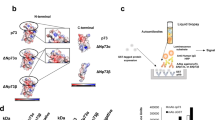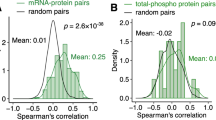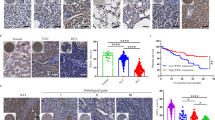Abstract
Recently our laboratory identified a cytoplasmic RNA-binding protein p62 which binds to and regulates the expression of IGF II mRNA. p62 was initially shown to be recognized by auto-antibodies in hepatocellular carcinoma (HCC) but now anti-p62 has been described in diverse malignancies. p62 is uniformly expressed in fetal liver and prominently in 33% of HCC nodules, but not detectable in adult liver or normal tissue adjacent to HCC nodules. In this study, a 90 kDa protein (p90), auto-antibodies to which were found associated with anti-p62 responses in the same HCC patient group, was identified by cDNA expression cloning. Indirect immunofluorescence showed that, like p62, p90 localized to the cytoplasm in cultured cells and mouse fetal, but not adult liver. Among 11 human gastric cancer tissues examined, p90 was overexpressed in six (55%). Together with other cancer associated auto-antibodies such as anti-p53, anti-p62, anti-Koc, and anti-CENP-F, auto-antibodies to p90 represent a new marker for tumors such as HCC and gastric cancer. Our data support the working hypothesis that auto-antibody production in cancer may be directly linked to aberrant auto-antigen expression.
This is a preview of subscription content, access via your institution
Access options
Subscribe to this journal
Receive 50 print issues and online access
$259.00 per year
only $5.18 per issue
Buy this article
- Purchase on Springer Link
- Instant access to full article PDF
Prices may be subject to local taxes which are calculated during checkout






Similar content being viewed by others
Abbreviations
- GC:
-
gastric cancer
- HCC:
-
hepatocellular carcinoma
- IMP:
-
IGF-II mRNA binding protein
- IP:
-
immunoprecipitation
- TnT:
-
in vitro transcription and translation
References
Altschul SF, Madden TL, Schaffer AA, Zhang Z, Miller W, Lipman DJ . 1997 Nucleic Acids Res. 25: 3389–3402
Braverman R, Bhattacharya B, Feuerstein N, Cooper HL . 1986 J. Biol. Chem. 261: 14342–14348
Bressac B, Kew M, Wands J, Ozturk M . 1991 Nature 350: 429–431
Chan EKL, Buyon JP . 1994 Manual of Biological Markers of Disease van Venrooij WJ and Maini RN (eds) Kluwer Academic Publishers: Dordrecht, Netherlands pp. 1–18
Chan EKL, Fritzler MJ . 1998 Elec. J. Biotechnol. 1: 1–10
Chan EKL, Hamel JC, Buyon JP, Tan EM . 1991 J. Clin. Invest. 87: 68–76
Covini G, von Mühlen CA, Pacchetti S, Colombo M, Chan EKL, Tan EM . 1997 J. Hepatol. 26: 1255–1265
Deshler JO, Highett MI, Abramson T, Schnapp BJ . 1998 Curr. Biol. 8: 489–496
Doyle GA, Betz NA, Leeds PF, Fleisig AJ, Prokipcak RD, Ross J . 1998 Nucleic Acids Res. 26: 5036–5044
Fields S, Song O . 1989 Nature 340: 245–246
Fritzler MJ, Kerfoot SM, Feasby TE, Zochodne DW, Westendorf JM, Dalmau JO, Chan EKL . 2000 J. Investig. Med. 48: 28–39
Hardin JA . 1986 Arthritis Rheum. 29: 457–460
Havin L, Git A, Elisha Z, Oberman F, Yaniv K, Schwartz SP, Standart N, Yisraeli JK . 1998 Genes Dev. 12: 1593–1598
Imai H, Nakano Y, Kiyosawa K, Tan EM . 1993 Cancer 71: 26–35
Kikuno R, Nagase T, Suyama M, Waki M, Hirosawa M, Ohara O . 2000 Nucleic Acids Res. 28: 331–332
Kiyosawa K, Sodeyama T, Tanaka E, Gibo Y, Yoshizawa K, Nakano Y, Furuta S, Akahane Y, Nishioka K, Purcell RH . 1990 Hepatology 12: 671–675
Kozak M . 1987 Nucleic Acids Res. 15: 8125–8148
Lu M, Nakamura RM, Dent ED, Zhang JY, Nielsen FC, Christiansen J, Chan EKL, Tan EM . 2001 Am. J. Pathol. 159: 945–953
Lupas A . 1997 Curr. Opin. Struct. Biol. 7: 388–393
Mueller-Pillasch F, Lacher U, Wallrapp C, Micha A, Zimmerhackl F, Hameister H, Varga G, Friess H, Buchler M, Beger HG, Vila MR, Adler G, Gress TM . 1997 Oncogene 14: 2729–2733
Nagase T, Kikuno R, Ishikawa K, Hirosawa M, Ohara O . 2000 DNA Res. 7: 143–150
Nielsen J, Christiansen J, Lykke-Andersen J, Johnsen AH, Wewer UM, Nielsen FC . 1999 Mol. Cell. Biol. 19: 1262–1270
Ochs RL, Stein Jr TW, Chan EKL, Ruutu M, Tan EM . 1996 Mol. Biol. Cell 7: 1015–1024
Rattner JB, Rees J, Whitehead CM, Casiano CA, Tan EM, Humbel RL, Conrad K, Fritzler MJ . 1997 Clin. Invest. Med. 20: 308–319
Ross AF, Oleynikov Y, Kislauskis EH, Taneja KL, Singer RH . 1997 Mol. Cell. Biol. 17: 2158–2165
Selak S, Chan EKL, Schoenroth L, Senecal JL, Fritzler MJ . 1999 J. Investig. Med. 47: 311–318
Shaw G, Kamen R . 1986 Cell 46: 659–667
Simonetti RG, Camma C, Fiorello F, Politi F, D'Amico G, Pagliaro L . 1991 Dig. Dis. Sci. 36: 962–972
Soussi T . 2000 Cancer Res. 60: 1777–1788
Tan EM . 1989 Adv. Immunol. 44: 93–151
Tan EM . 2001 J. Clin. Invest. 108: 1411–1415
Tan EM, Chan EKL, Sullivan KF, Rubin RL . 1988 Clin. Immunol. Immunopathol. 47: 121–141
Wang D, Buyon JP, Zhu W, Chan EKL . 1999 J. Clin. Invest. 104: 1265–1275
Wang D, Chan EKL . 1996 J. Invest. Dermatol. 107: 610–614
Zhang JY, Chan EKL, Peng XX, Lu M, Wang X, Mueller F, Tan EM . 2001a Clin. Immunol. 100: 149–156
Zhang JY, Chan EKL, Peng XX, Tan EM . 1999 J. Exp. Med. 189: 1101–1110
Zhang JY, Dai M, Wang X, Lu WQ, Li DS, Zhang MX, Wang KJ, Dai LP, Han SG, Zhou YF, Zhuang H . 1998a Int. J. Epidemiol. 27: 574–578
Zhang JY, Wang X, Han SG, Zhuang H . 1998b Am. J. Trop. Med. Hyg. 59: 947–951
Zhang JY, Zhu W, Imai H, Kiyosawa K, Chan EKL, Tan EM . 2001b Clin. Exp. Immunol. 125: 3–9
Acknowledgements
We thank Dr Eng M Tan for his encouragement, support and comments during this study. This is publication 14396-MEM from The Scripps Research Institute. This work was supported in part by National Institutes of Health Grants CA56956 and AI39645, the Sam and Rose Stein Charitable Trust, and NIH grant M01RR00833 provided to the General Clinical Research Center of The Scripps Research Institute.
Author information
Authors and Affiliations
Corresponding author
Rights and permissions
About this article
Cite this article
Hoo, L., Zhang, J. & Chan, E. Cloning and characterization of a novel 90 kDa ‘companion’ auto-antigen of p62 overexpressed in cancer. Oncogene 21, 5006–5015 (2002). https://doi.org/10.1038/sj.onc.1205625
Received:
Revised:
Accepted:
Published:
Issue Date:
DOI: https://doi.org/10.1038/sj.onc.1205625
Keywords
This article is cited by
-
Cancer progression by the okadaic acid class of tumor promoters and endogenous protein inhibitors of PP2A, SET and CIP2A
Journal of Cancer Research and Clinical Oncology (2023)
-
Cancerous Inhibitor of Protein Phosphatase 2A (CIP2A): Could It Be a Promising Biomarker and Therapeutic Target in Parkinson’s Disease?
Molecular Neurobiology (2022)
-
Deregulation of protein phosphatase 2A inhibitor SET is associated with malignant progression in breast cancer
Scientific Reports (2021)
-
The concept of the okadaic acid class of tumor promoters is revived in endogenous protein inhibitors of protein phosphatase 2A, SET and CIP2A, in human cancers
Journal of Cancer Research and Clinical Oncology (2018)
-
Autoantibody response to Sui1 and its tissue-specific expression in hepatocellular carcinoma
Tumor Biology (2016)



